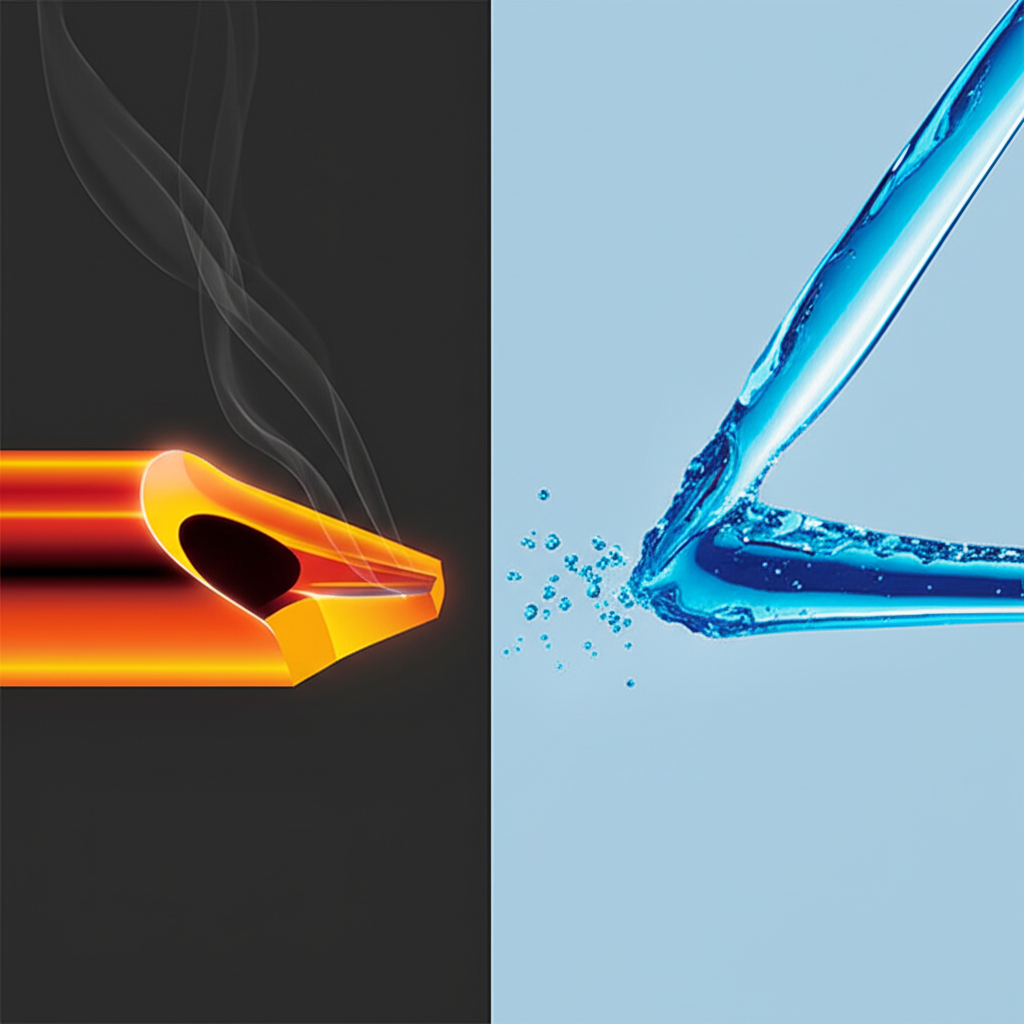Mastering Titanium CNC Machining for Aerospace Parts

TL;DR
Titanium CNC machining for aerospace is a specialized manufacturing process for creating strong, lightweight, and heat-resistant components essential for modern aircraft and spacecraft. This method leverages titanium's exceptional strength-to-weight ratio and corrosion resistance. However, the process presents significant challenges, including high heat generation and rapid tool wear, requiring advanced equipment and deep technical expertise to achieve the required precision for critical applications.
Understanding the Critical Role of Titanium in Aerospace
Titanium has earned its reputation as a premier material in the aerospace industry, where performance and safety are non-negotiable. Its value lies in a unique combination of physical properties that make it superior to many other metals for demanding applications, from airframes to mission-critical engine parts. The decision to use titanium is driven by the need for components that can withstand extreme conditions without adding unnecessary weight, a critical factor in fuel efficiency and overall performance.
The benefits of using titanium alloys, especially in CNC-machined components, are extensive and directly address the core challenges of aerospace engineering. Manufacturers select specific titanium grades to meet precise performance criteria, ensuring reliability under immense stress. The key properties that make titanium indispensable include:
- High Strength-to-Weight Ratio: Titanium alloys offer strength comparable to many types of steel but are approximately 40% lighter. This characteristic is a game-changer for aerospace design, as reducing an aircraft's weight directly improves its fuel efficiency, range, and payload capacity.
- Superior Corrosion Resistance: Titanium is exceptionally resistant to corrosion from jet fuel, de-icing fluids, and harsh atmospheric conditions, including saltwater environments. This durability ensures a longer service life for critical components and reduces maintenance requirements over the aircraft's operational lifespan.
- Performance at Extreme Temperatures: Aerospace components, particularly those in and around engines, must function reliably at incredibly high temperatures. Titanium alloys maintain their structural integrity and strength at elevated temperatures where other materials like aluminum alloys would fail, making them ideal for turbine blades and exhaust systems.
The Unique Challenges of Machining Titanium Alloys
While titanium's properties make it ideal for aerospace applications, they also make it notoriously difficult to machine. The same characteristics that provide strength and resilience create significant hurdles during the CNC machining process. Overcoming these challenges requires specialized equipment, advanced techniques, and a deep understanding of the material's behavior under the stress of cutting and shaping.
One of the most significant issues is titanium's poor thermal conductivity. Unlike aluminum, which dissipates heat quickly, titanium tends to concentrate heat at the point of contact between the cutting tool and the workpiece. This intense heat buildup can lead to premature tool wear, damage the workpiece's surface integrity, and even cause thermal distortion. To manage this, machinists must employ strategies like using high-pressure coolant systems and carefully controlling cutting parameters. According to Frigate Manufacturing, implementing high-pressure coolant can increase tool life by as much as 30%.
Another major challenge is the high cutting force required to shape titanium. Its inherent strength means that cutting tools are subjected to extreme stress, leading to rapid wear and potential failure. This necessitates the use of robust, often expensive, cutting tools made from materials like carbide with specialized coatings. Furthermore, titanium has a tendency to gall, or chemically react and weld itself to the cutting tool surface at high temperatures and pressures. This adhesion can ruin both the tool and the part. Machinists mitigate these issues by using slower machining speeds, higher feed rates, and shallow cuts to reduce tool engagement time and manage heat effectively.

Essential Titanium Grades for Aerospace Applications
Selecting the correct titanium alloy is a critical step in aerospace manufacturing, as different grades offer distinct combinations of strength, corrosion resistance, weldability, and heat tolerance. While numerous alloys exist, a few have become industry standards due to their proven performance in critical applications. Understanding their characteristics helps engineers and designers specify the ideal material for components ranging from fasteners to major structural elements.
The most widely used alloy in the aerospace sector is Ti-6Al-4V, commonly known as Grade 5. It accounts for a significant portion of all titanium used in the industry because it provides an excellent all-around balance of high strength, light weight, and good corrosion resistance. Other commercially pure grades, like Grade 2, are valued for their superior corrosion resistance and formability, though they offer lower strength than their alloyed counterparts. The choice of grade directly impacts not only the final component's performance but also the machining strategy required.
| Grade/Alloy Name | Key Characteristics | Typical Aerospace Applications |
|---|---|---|
| Grade 5 (Ti-6Al-4V) | The most common titanium alloy. Excellent balance of high strength, good ductility, and heat treatability. Superior strength-to-weight ratio. | Structural airframe components, landing gear, turbine blades, engine parts, and high-performance fasteners. |
| Grade 2 (Commercially Pure) | Medium strength with excellent weldability, formability, and outstanding corrosion resistance, particularly in oxidizing environments. | Airframe skins, ductwork, brackets, and non-structural components where corrosion resistance is paramount. |
| Grade 1 (Commercially Pure) | The softest and most ductile grade. Offers the best formability and impact toughness, along with excellent corrosion resistance. Lower strength than other grades. | Applications requiring complex forming or where high ductility is needed, such as certain types of heat exchangers or architectural elements. |
Key Capabilities to Demand from Your Aerospace Machining Partner
Choosing the right CNC machining partner is as critical as selecting the right material for aerospace components. The extreme precision, tight tolerances, and stringent quality standards required in this sector mean that not all machine shops are equipped to handle the complexities of titanium. When evaluating potential suppliers, it is essential to look for specific capabilities and proven experience that align with the high-stakes nature of aerospace manufacturing.
A capable partner will not only possess advanced machinery but also a culture of quality and meticulous process control. Their expertise directly translates into the reliability and safety of the final components. For businesses seeking a reliable supplier, providers like XTJ offer a strong example, providing rapid production with advanced 4 and 5-axis CNC machining centers capable of handling over 30 materials with tolerances down to +/- 0.005mm. When vetting a partner for your custom CNC titanium parts, consider the following essential criteria:
- Multi-Axis CNC Machining Expertise: The complex geometries of many aerospace parts, such as turbine blades and intricate housings, require 5-axis CNC machines. A qualified partner must have extensive experience with multi-axis machining to produce these parts efficiently and accurately in a single setup, reducing the risk of errors from repositioning.
- Adherence to Aerospace Quality Standards (AS9100): Certification to the AS9100 quality management system is the industry standard for aerospace manufacturing. This certification demonstrates a provider's commitment to quality, traceability, and risk management throughout the entire production process, which is a fundamental requirement for any aerospace supplier.
- Proven Experience with Titanium Alloys: Ask for specific examples and case studies of past projects involving titanium. An experienced partner will understand the unique challenges of machining titanium—from heat management to tool selection—and will have developed proven processes to overcome them, as detailed by experts at W Machine Works.
- Advanced Quality Control and Inspection: The ability to verify part accuracy is crucial. Look for a partner with a dedicated, climate-controlled inspection lab equipped with Coordinate Measuring Machines (CMMs), laser scanners, and other advanced metrology tools to validate that every component meets strict dimensional and geometric tolerances.

Achieving Precision in Aerospace Manufacturing
Mastering titanium CNC machining for aerospace is a testament to manufacturing excellence. It requires a harmonious blend of advanced material science, cutting-edge technology, and deep-seated expertise. The unique properties that make titanium the material of choice—its strength, lightness, and resistance—are the very same that challenge machinists. Successfully navigating these challenges is what separates standard machine shops from true aerospace manufacturing partners.
Ultimately, the reliability of every component machined from titanium has direct implications for safety and performance in the aerospace and defense sectors. Therefore, the selection of a machining partner should be based on a proven ability to deliver flawless parts that meet the most stringent specifications. By prioritizing expertise in multi-axis machining, adherence to AS9100 standards, and robust quality control, companies can ensure their critical components are built for the extreme demands of flight.
Frequently Asked Questions
1. Which CNC machine is best suited for high precision aerospace components?
For high-precision aerospace components, multi-axis CNC machines, particularly 5-axis machines, are often the best choice. They can produce complex shapes and intricate geometries in a single setup, which minimizes the need to re-fixture the part. This reduces the potential for errors and increases accuracy. Multi-spindle machines can also enhance productivity for mass production without compromising precision.
2. Is aerospace grade titanium good?
Yes, aerospace-grade titanium, such as Ti-6Al-4V (Grade 5), is an exceptional material for its intended applications. Its combination of a high strength-to-weight ratio, excellent resistance to corrosion and fatigue, and ability to perform under extreme temperatures makes it vital for the aerospace industry. These properties contribute to lighter, more fuel-efficient, and durable aircraft and spacecraft.
-
Posted in
aerospace manufacturing, CNC aerospace, precision machining, titanium alloys, titanium machining





